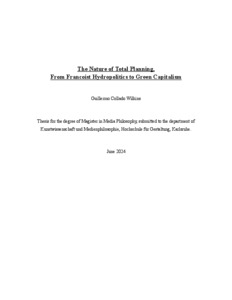Max Grünberg
| Name | Max Grünberg |
1 Inhalte
- Seite 1 von 1
The Nature of Total Planning
- Titel
- The Nature of Total Planning
- Titel (en)
- The Nature of Total Planning
- Untertitel
- From Francoist Hydropolitics to Green Capitalism
- Untertitel des Projekts/Werks (en)
- From Francoist Hydropolitics to Green Capitalism
- Autor/in
- Beschreibung (en)
- To what extent is sustainable development truly sustainable? In which ways is it different from previous ecological regimes, such as the extractivist practices of XXth century authoritarianisms? How do plans, and models, mediate between different temporalities? What can we learn about our social metabolism by studying climate scenarios as political techniques of government?
'The Nature of Total Planning' tries to answer these question by doing a close reading of the environmental history of La Bizkaia, a godforsaken valley in northern Spain. Historicising La Bizkaia’s social metabolism is the first step for a political and epistemological critique of green capitalism. A broader investigation of Francoist hydropolitics contextualises the pine monoculture as part of a national programme to enrol nature into Franco’s political project. The last section of this thesis compares that model with how La Bizkaia is managed today, under the sustainable development paradigm. While, discursively, sustainable development distances itself from the extractivist practices of fascist autarky, 'The Nature of Total Planning' reveals striking continuities in the material practices of La Bizkaia’s forestry management.
- To what extent is sustainable development truly sustainable? In which ways is it different from previous ecological regimes, such as the extractivist practices of XXth century authoritarianisms? How do plans, and models, mediate between different temporalities? What can we learn about our social metabolism by studying climate scenarios as political techniques of government?
- Kategorie
- Typ des Projekts/Werks
- Schlagworte
- Datierung
- 06.06.2024
- Mitwirkende
- Dank an
- Boris Buden
- Nagore Chivite Lizarraga
- Ariana Dongus
- Christian Egerer
- Víctor Fancelli Capdevila
- Max Grünberg
- Sami Khatib
- Jule Köpke
- Barbara Kuon
- Livia Lazzarini
- Iñigo Mazkiaran
- Matteo Pasquinelli
- César Alonso Porras
- Juan José Recalde
- Jess Saxby
- Valentin Schwarz
- Mariana Silva
- Ionel Spanachi
- Iñigo Villafranca Apesteguía
- Lioudmila Voropai
- Sprache
- Ort: Institution
- Stadt
- Land
- Beteiligte Institution(en)
- Internetlinks
- Titel
- The Nature of Total Planning
- Projektleiter/in
- Studiengang
- Typ der Abschlussarbeit
- Importiert am
- 22.10.2024
- Übergeordnete Sets
- 0
- Set enthält
- 0 1
